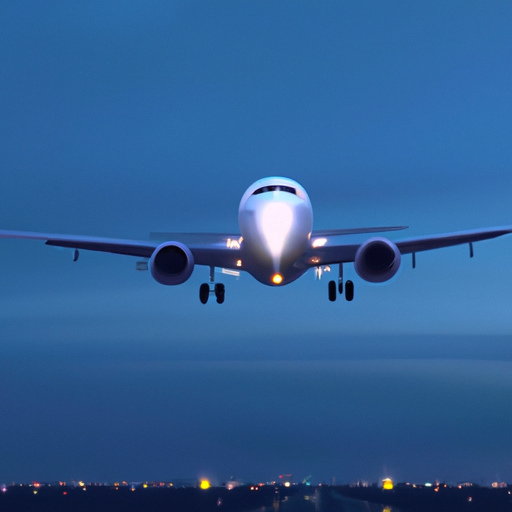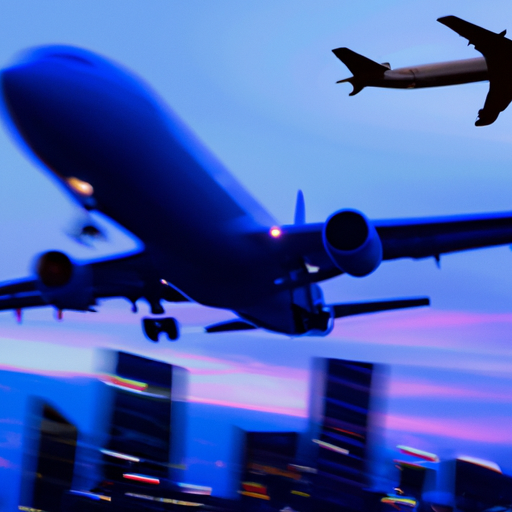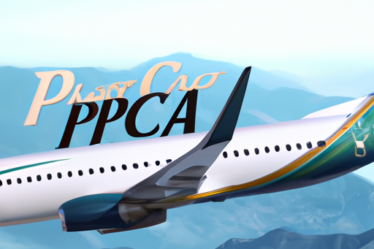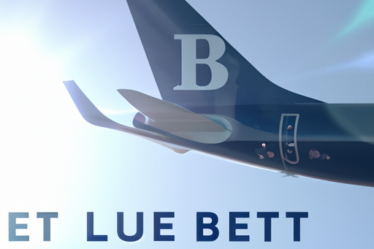
Exploring the Factors Behind the Unusual Decline in Air Travel Demand
Unusual Decline in Air Travel Demand
Exploring the Factors Behind the Unusual Decline in Air Travel Demand
In recent months, the world has witnessed an unprecedented decline in air travel demand. The COVID-19 pandemic has brought the global aviation industry to a standstill, with airlines grounding their fleets and airports resembling ghost towns. But what are the factors behind this unusual decline in air travel demand? Let’s delve into the key reasons that have contributed to this unprecedented situation.
First and foremost, the fear of contracting the virus has played a significant role in the decline of air travel demand. With the rapid spread of COVID-19 across the globe, people have become increasingly cautious about traveling, especially in confined spaces like airplanes. The fear of being in close proximity to potentially infected individuals has led to a sharp decrease in the number of passengers willing to fly.
Furthermore, travel restrictions and lockdown measures imposed by governments worldwide have severely impacted air travel demand. Many countries have closed their borders, implemented mandatory quarantine periods, and imposed strict travel advisories. These measures have effectively discouraged people from embarking on non-essential trips, further contributing to the decline in air travel demand.
Another factor that has influenced the decline in air travel demand is the economic impact of the pandemic. With businesses shutting down, employees being laid off, and uncertainty looming over the global economy, people are tightening their belts and cutting back on discretionary spending. Travel, particularly air travel, is often considered a luxury, and in times of financial uncertainty, it is one of the first expenses to be eliminated.
Moreover, the aviation industry itself has been hit hard by the pandemic. Airlines have faced significant financial losses due to the decrease in passenger numbers. As a result, many carriers have been forced to reduce their flight schedules, cancel routes, and even declare bankruptcy. This reduction in available flights has further dampened air travel demand, as passengers face limited options and increased uncertainty when planning their trips.
Additionally, the implementation of health and safety protocols has also impacted air travel demand. Airlines and airports have had to adopt stringent measures to ensure the safety of passengers and staff, such as mandatory mask-wearing, temperature checks, and increased sanitization procedures. While these measures are necessary to prevent the spread of the virus, they have added an extra layer of inconvenience and discomfort for travelers, further discouraging them from flying.
Lastly, the shift towards remote work and virtual meetings has also contributed to the decline in air travel demand. With the widespread adoption of video conferencing platforms and remote collaboration tools, many businesses have found alternative ways to conduct meetings and conferences without the need for travel. This shift in work culture has reduced the necessity for business travel, which was once a significant driver of air travel demand.
In conclusion, the unusual decline in air travel demand can be attributed to a combination of factors. The fear of contracting the virus, travel restrictions, economic uncertainty, financial constraints, reduced flight schedules, health and safety protocols, and the shift towards remote work have all played a role in this unprecedented situation. As the world continues to grapple with the effects of the pandemic, it remains to be seen how the aviation industry will recover and adapt to the new normal.
The Impact of COVID-19 on Air Travel: Unraveling the Unprecedented Decline

The Impact of COVID-19 on Air Travel: Unraveling the Unprecedented Decline
The COVID-19 pandemic has had a profound impact on various industries, and one of the hardest-hit sectors is air travel. The decline in air travel demand has been nothing short of unusual, with airlines experiencing a significant decrease in passengers and flights. This article aims to explore the reasons behind this unprecedented decline and shed light on the future of air travel in a post-pandemic world.
One of the primary reasons for the decline in air travel demand is the fear of contracting the virus. With the rapid spread of COVID-19, people have become increasingly cautious about traveling, especially in confined spaces like airplanes. The fear of being in close proximity to potentially infected individuals has led to a sharp decrease in bookings and a reluctance to embark on non-essential trips.
Furthermore, travel restrictions and lockdown measures imposed by governments worldwide have severely impacted air travel. Many countries have closed their borders or implemented strict quarantine requirements, making it difficult for people to travel freely. This has not only deterred leisure travelers but has also affected business travel, as companies have resorted to virtual meetings and conferences instead.
The economic impact of the pandemic has also played a significant role in the decline of air travel demand. With widespread job losses and financial uncertainty, many individuals and families have had to tighten their budgets and prioritize essential expenses. Travel, especially by air, is often considered a luxury, and in times of economic hardship, it is one of the first areas where people cut back.
In addition to these factors, the aviation industry itself has faced numerous challenges during the pandemic. Airlines have had to cancel flights, lay off employees, and even file for bankruptcy in some cases. The uncertainty surrounding the future of the industry has further discouraged potential travelers from booking flights.
However, despite the current decline in air travel demand, there is hope for the industry’s recovery. As vaccines become more widely available and the global population achieves herd immunity, people may regain confidence in air travel. Airlines have also implemented stringent health and safety measures to reassure passengers, such as enhanced cleaning protocols and mandatory mask-wearing.
Moreover, the desire for travel and exploration is deeply ingrained in human nature. Once the pandemic is under control, it is likely that people will be eager to resume their travel plans and make up for lost time. The pent-up demand for travel could lead to a surge in bookings and a revitalization of the aviation industry.
However, it is important to acknowledge that the future of air travel may not be the same as it was before the pandemic. The rise of remote work and virtual meetings may continue to impact business travel, as companies realize the cost-effectiveness and convenience of online interactions. Additionally, the environmental impact of air travel has come under scrutiny, and there may be a shift towards more sustainable modes of transportation in the long run.
In conclusion, the decline in air travel demand due to the COVID-19 pandemic has been unprecedented and has had far-reaching consequences for the aviation industry. Fear of the virus, travel restrictions, economic uncertainty, and industry challenges have all contributed to this decline. However, with the rollout of vaccines and the eventual control of the pandemic, there is hope for a recovery in air travel demand. The industry may undergo changes, but the desire to explore the world and connect with others remains strong.
Unusual Decline in Air Travel Demand: A Shift in Consumer Behavior or Temporary Phenomenon?
Unusual Decline in Air Travel Demand: A Shift in Consumer Behavior or Temporary Phenomenon?
In recent months, the world has witnessed an unprecedented decline in air travel demand. This unexpected turn of events has left many industry experts scratching their heads, trying to understand the underlying causes. Is this a mere blip on the radar, or does it signify a significant shift in consumer behavior?
One possible explanation for this decline is the ongoing COVID-19 pandemic. With the virus spreading rapidly across the globe, governments have implemented strict travel restrictions and lockdown measures. This has resulted in a sharp decrease in both domestic and international travel. People are understandably concerned about their health and safety, and many have chosen to stay home rather than risk exposure to the virus in crowded airports and airplanes.
Another factor contributing to the decline in air travel demand is the economic impact of the pandemic. Many individuals and families have experienced job losses or reduced income, making travel a luxury they can no longer afford. With financial uncertainty looming, people are cutting back on discretionary spending, including travel expenses. This has led to a significant decrease in leisure travel, as well as business travel, as companies tighten their budgets and opt for virtual meetings instead.
Furthermore, the rise of remote work has also played a role in the decline of air travel demand. As more companies embrace flexible work arrangements, employees are no longer required to travel as frequently for business purposes. Meetings that once required a face-to-face interaction can now be conducted through video conferencing platforms, eliminating the need for air travel. This shift in work culture has had a profound impact on the airline industry, as it has drastically reduced the number of business travelers.
However, it is important to consider whether this decline in air travel demand is a temporary phenomenon or a long-term shift in consumer behavior. As the world gradually recovers from the pandemic, travel restrictions may be lifted, and people may regain confidence in air travel. The desire to explore new destinations and reconnect with loved ones may outweigh the fear of contracting the virus. Additionally, the pent-up demand for travel could lead to a surge in bookings once the situation stabilizes.
Moreover, the airline industry has proven its resilience time and time again. In the face of previous crises, such as the 9/11 attacks and the global financial recession, the industry has managed to bounce back and adapt to changing circumstances. Airlines have implemented stringent health and safety measures to reassure passengers, such as enhanced cleaning protocols and mandatory mask-wearing. These measures, coupled with the development of effective vaccines, may help restore consumer confidence and revive air travel demand.
In conclusion, the unusual decline in air travel demand can be attributed to a combination of factors, including the COVID-19 pandemic, economic uncertainty, and the rise of remote work. While it is difficult to predict the future with certainty, it is possible that this decline is a temporary phenomenon rather than a permanent shift in consumer behavior. As the world navigates through these challenging times, the airline industry must continue to adapt and innovate to meet the changing needs and expectations of travelers.


